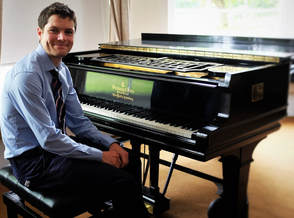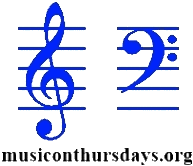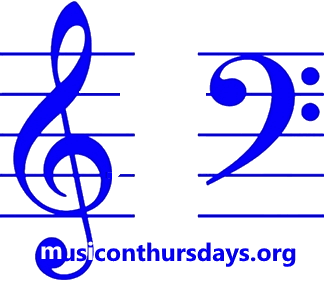Programme
Johann Sebastian Bach (1685-1750)
Toccata in G Minor, BWV 915 (1707-1709) Adagio - Allegro - Adagio Frédéric François Chopin (1810-1849) Ballade No 4 in F minor, Op 52 (1842) Waltz in Ab major, Valse de l'Adieu Farewell Waltz Op 69 No 1 (1835) arr Leopold Godowsky (1870-1938) Waltz in Db major, Minute Waltz Op 64 No 1 (1847) arr Leopold Godowsky Maurice Ravel (1875-1937) Menuet sur le nom d'Haydn No 58 (1909) George Gershwin (1898-1937) Liza (all the clouds'll roll away) (1929) Earl Wild (1915-2010) Étude No 1, based on George Gershwin's "Liza" Nikolai Girshevich Kapustin (b1937) Concert Etude in C major 'Prelude', Op 40 No 1 (1984) Richard Rodgers (1902-1979) & Oscar Hammerstein (1895-1960) from the musical The Sound of Music (1959) My Favourite Things arr Daniel Nicholson Concert Duration: 45-50 minutes |
Free Concert, with a retiring collection to cover costs. Tea and coffee will be available after the concert.
Daniel Nicholson

Daniel Nicholson was brought up in Norwich and began learning the piano from a very early age using the Suzuki method. His Suzuki teacher's and family's support allowed him to develop quickly as a musician and he later went on to broaden his learning by taking on a further teacher in Jazz piano.
Having such a diverse musical background gave Daniel an interesting perspective on piano repertoire and technique which carried him through to his studies at the Royal Welsh College of Music and Drama where he graduated with Bachelors and Masters degrees studying in both Jazz and Classical departments. It was during these studies that he was taught by world class musicians, lecturers, and industry experts in addition to collaborating with talented peers in world class facilities. To this day Daniel recognises this time as a huge privilege and one that successfully set him up as a professional educator and musician in SW London.
In London, Daniel honed his teaching skills and built his business Cadenza Music Tuition from scratch. This now has a team of tutors covering SW London providing piano and music theory tuition under Daniel's management and guidance. Daniel himself has recently moved to Cardiff where he teaches under the same business name from his home teaching studio. As part of this business he is also writing his own book series called Missing Bars that is intended to fuse some of the aspects traditionally associated with Jazz piano, such as improvisation, to the early and intermediate stages of learning the piano.
In the years to come, he intends to bring in further tutors in both Cardiff and SW London as the business expands, and one day see his books published.
As a pianist, he plays for societies and clubs as a soloist a few times a year in addition to various exploits as an accompanist. One unifying aspect of almost everything Daniel does is to explore and bridge the gap between Jazz and Classical disciplines. It is this fascination drives his teaching and playing.
Having such a diverse musical background gave Daniel an interesting perspective on piano repertoire and technique which carried him through to his studies at the Royal Welsh College of Music and Drama where he graduated with Bachelors and Masters degrees studying in both Jazz and Classical departments. It was during these studies that he was taught by world class musicians, lecturers, and industry experts in addition to collaborating with talented peers in world class facilities. To this day Daniel recognises this time as a huge privilege and one that successfully set him up as a professional educator and musician in SW London.
In London, Daniel honed his teaching skills and built his business Cadenza Music Tuition from scratch. This now has a team of tutors covering SW London providing piano and music theory tuition under Daniel's management and guidance. Daniel himself has recently moved to Cardiff where he teaches under the same business name from his home teaching studio. As part of this business he is also writing his own book series called Missing Bars that is intended to fuse some of the aspects traditionally associated with Jazz piano, such as improvisation, to the early and intermediate stages of learning the piano.
In the years to come, he intends to bring in further tutors in both Cardiff and SW London as the business expands, and one day see his books published.
As a pianist, he plays for societies and clubs as a soloist a few times a year in addition to various exploits as an accompanist. One unifying aspect of almost everything Daniel does is to explore and bridge the gap between Jazz and Classical disciplines. It is this fascination drives his teaching and playing.
Concert at Home
If you cannot be with us at the lunchtime concert
you can enjoy a similar Concert at Home by clicking through the videos or recordings below:
you can enjoy a similar Concert at Home by clicking through the videos or recordings below:
Our concert opens with JS Bach's Toccata in G minor, BWV 915.
In your concert at home you will also be able to listen to the Fugue, on harpsichord if you choose to follow the score as it scrolls on the right, or on piano by choosing the video on the left.
(If you wish to move to the next item on the programme, the Fugue begins after approx 5 mins.)
In your concert at home you will also be able to listen to the Fugue, on harpsichord if you choose to follow the score as it scrolls on the right, or on piano by choosing the video on the left.
(If you wish to move to the next item on the programme, the Fugue begins after approx 5 mins.)
|
|
|
The first of our two Chopin works in this concert is his Ballade No 4 in F minor.
The pianist in this recording in Lang Lang:
The pianist in this recording in Lang Lang:
Daniel Nicholson's second Chopin work is the Farewell Waltz in F minor. The performer here is Jean Muller, at a 2013 concert in King's Place, London:
Next we hear Ravel's lovely Menuet sur le nom d'Haydn. If you're wondering how we get notes for N and Y,
Ravel transforms the name as follows:
Ravel transforms the name as follows:
|
H, which in the German musical alphabet signifies B-natural;
A, which is A-natural; Y, which, if musical alphabet is cycled through the full alphabet, produces D-natural; D, which is D-natural; and N, which cycled through the full alphabet gives the note G-natural. The pianist is Eric Tran: |
We are going to hear two versions of George Gershwin's 1920s Jazz standard, Liza.
Here with the original is Marc-André Hamelin, recorded at Wynaston, the Nimbus Records funded concert hall near Monmouth:
Here with the original is Marc-André Hamelin, recorded at Wynaston, the Nimbus Records funded concert hall near Monmouth:
American pianist Earl Wild transcribed much music of the early jazz era as well as classical works.
Let's hear Marc-André Hamelin again, this time with Wild's Étude No 1, based on George Gershwin's 'Liza'.
After that, treat yourself to the scrolling score video on the right...
in which the pianist is none other than Earl Wild:
Let's hear Marc-André Hamelin again, this time with Wild's Étude No 1, based on George Gershwin's 'Liza'.
After that, treat yourself to the scrolling score video on the right...
in which the pianist is none other than Earl Wild:
|
|
|
Next comes another chance to hear a composer performing his own work.
Nikolai Kapustin plays his lively Étude No 1 'Prelude', written in 1984:
Nikolai Kapustin plays his lively Étude No 1 'Prelude', written in 1984:
Our concert ends with Dan Nicholson's piano arrangement of the Rodgers & Hammerstein hit song from The Sound of Music, My Favourite Things. On the left we hear British pianist Alister Brown play the piece straight, as it were. On the right is a jazz interpretation of the song played by Levi Barcourt:
|
|
|
We hope you have enjoyed your Concert at Home.
|
Directions to
Leatherhead Methodist Church |
Music on Thursdays
at St John's Old Chapel Buck Brass Trio trumpet - horn - trombone 24 Aug 2017 |
William Robert Allenby
operatic bass-baritone Emanuele Mollica, piano courtesy of the London College of Music 7 September 2017 |
Wednesdays at Christ Church
Organ Diary |












